Unit 3 Could you please tell me where the restrooms are? section B 2a-2d课件(23张)
文档属性
| 名称 | Unit 3 Could you please tell me where the restrooms are? section B 2a-2d课件(23张) | 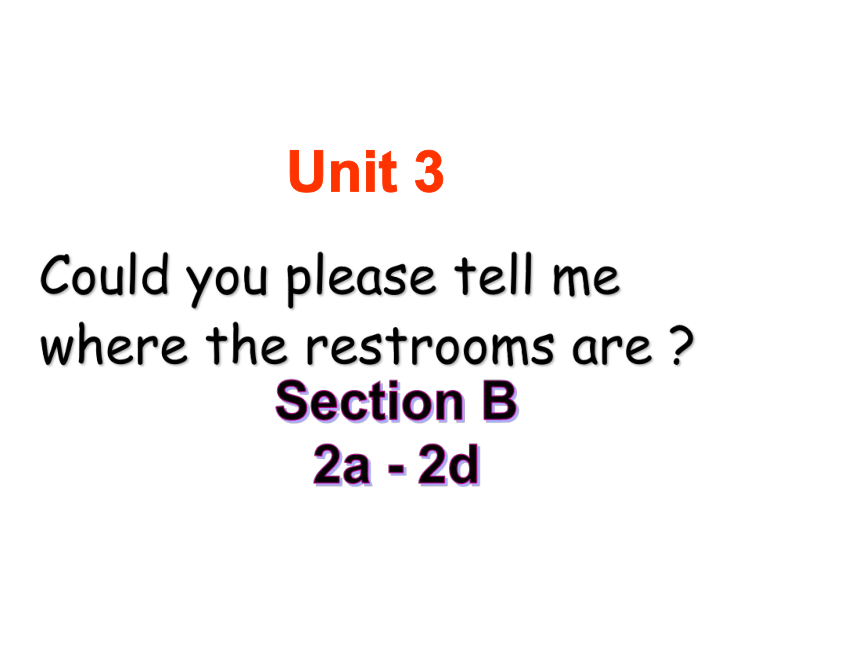 | |
| 格式 | zip | ||
| 文件大小 | 1.5MB | ||
| 资源类型 | 教案 | ||
| 版本资源 | 人教新目标(Go for it)版 | ||
| 科目 | 英语 | ||
| 更新时间 | 2018-10-26 11:15:59 | ||
图片预览

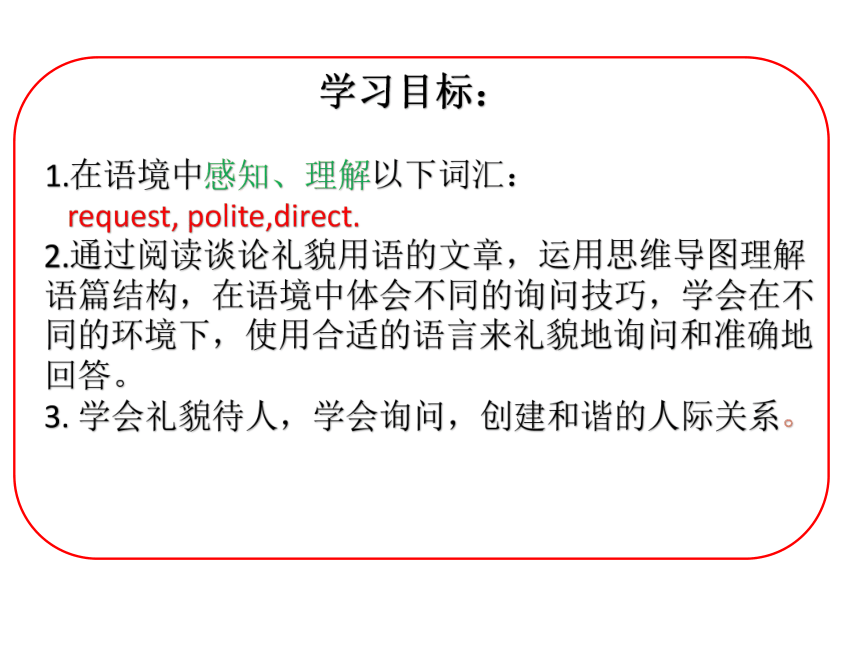
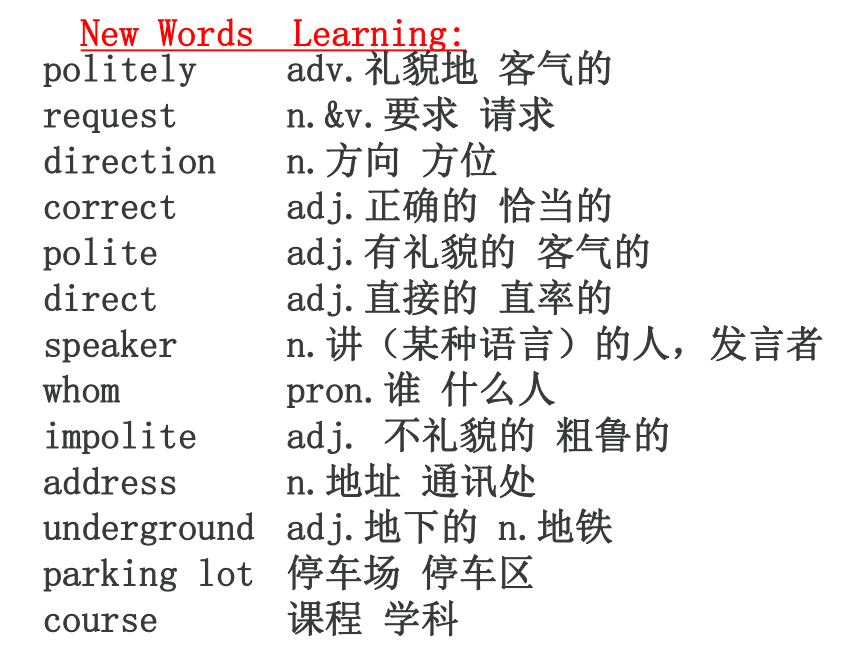
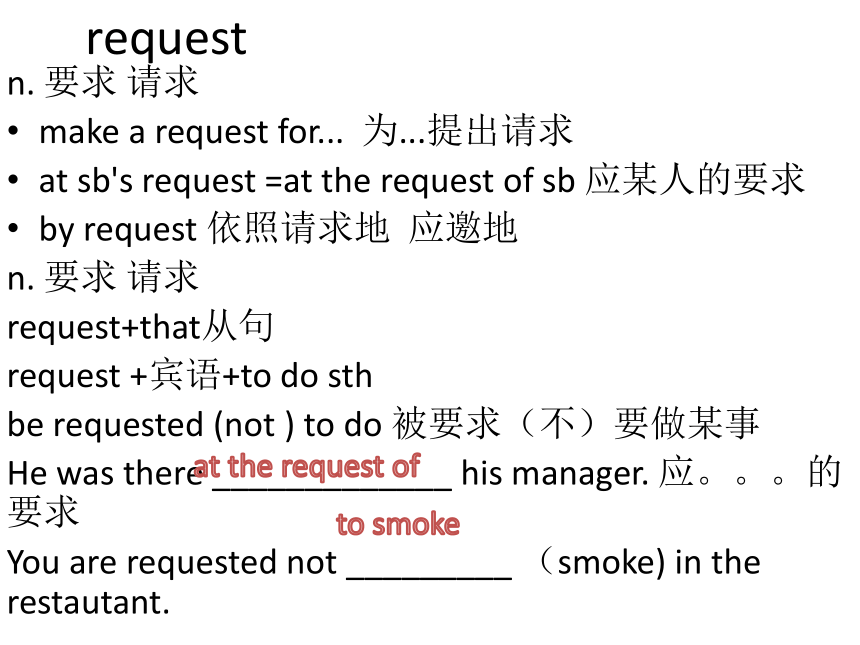
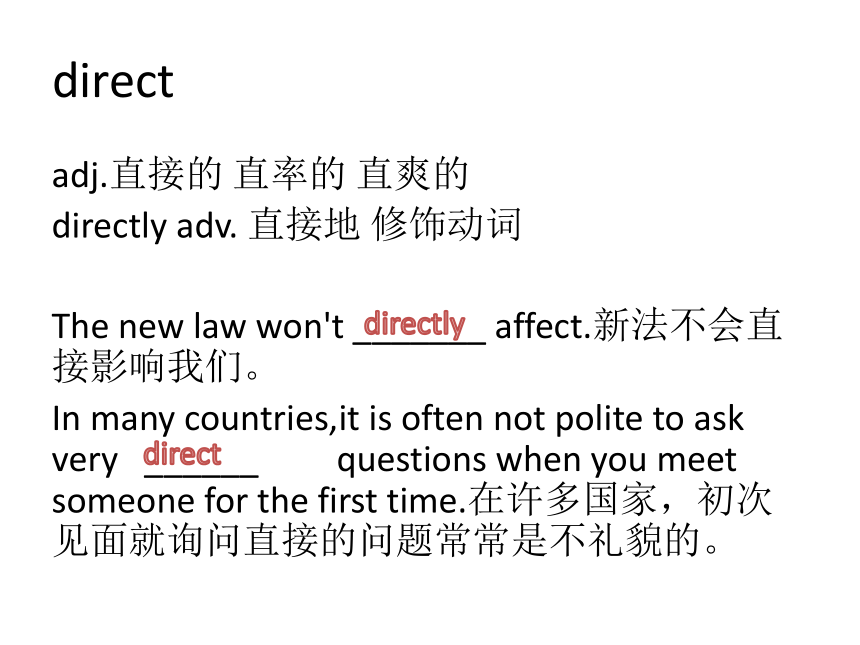
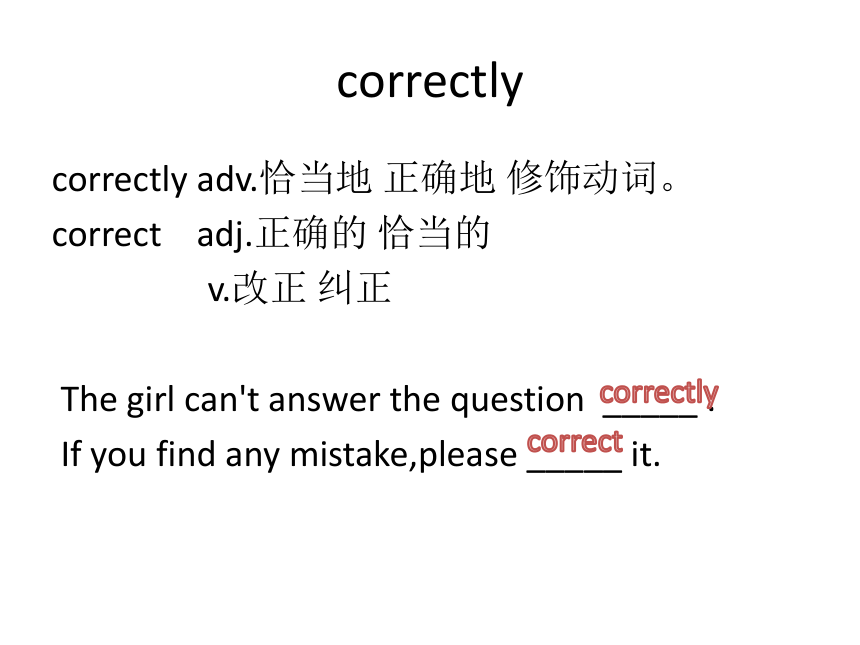
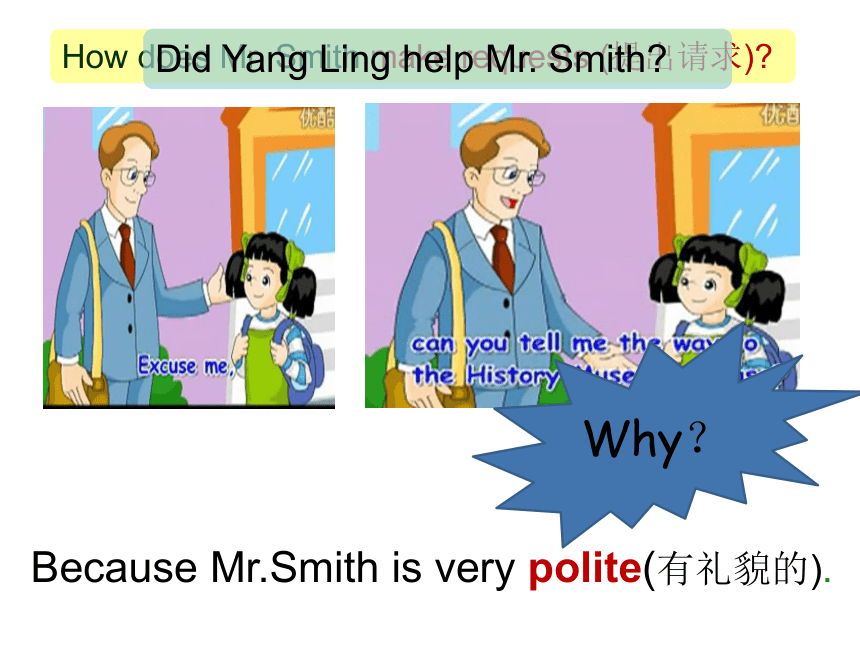
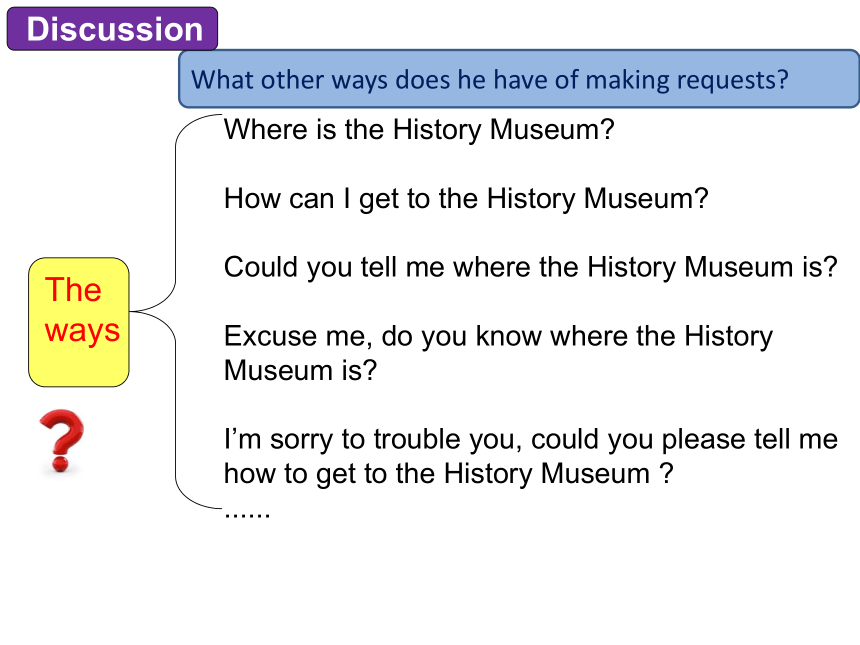
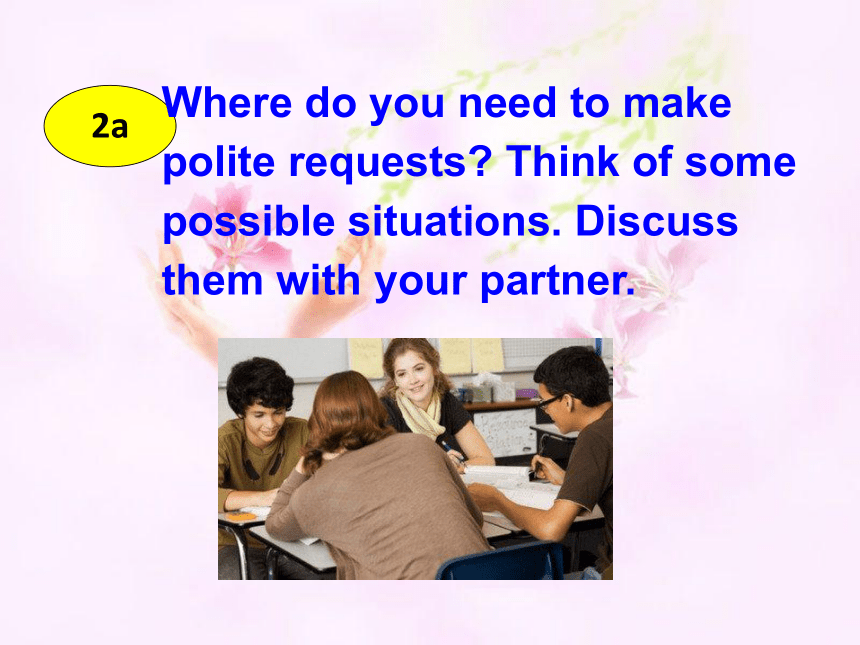
文档简介
Unit 3
Could you please tell me
where the restrooms are ?
Section B
2a - 2d
学习目标:
1.在语境中感知、理解以下词汇:
request, polite,direct.
2.通过阅读谈论礼貌用语的文章,运用思维导图理解语篇结构,在语境中体会不同的询问技巧,学会在不同的环境下,使用合适的语言来礼貌地询问和准确地回答。
3. 学会礼貌待人,学会询问,创建和谐的人际关系。
New Words Learning:
politely
request
direction
correct
polite
direct
speaker
whom
impolite
address
underground
parking lot
course
adv.礼貌地 客气的
n.&v.要求 请求
n.方向 方位
adj.正确的 恰当的
adj.有礼貌的 客气的
adj.直接的 直率的
n.讲(某种语言)的人,发言者
pron.谁 什么人
adj. 不礼貌的 粗鲁的
n.地址 通讯处
adj.地下的 n.地铁
停车场 停车区
课程 学科
request
n. 要求 请求
make a request for... 为...提出请求
at sb's request =at the request of sb 应某人的要求
by request 依照请求地 应邀地
n. 要求 请求
request+that从句
request +宾语+to do sth
be requested (not ) to do 被要求(不)要做某事
He was there _____________ his manager. 应。。。的要求
You are requested not _________ (smoke) in the restautant.
at the request of
to smoke
direct
adj.直接的 直率的 直爽的
directly adv. 直接地 修饰动词
The new law won't _______ affect.新法不会直接影响我们。
In many countries,it is often not polite to ask very ______ questions when you meet someone for the first time.在许多国家,初次见面就询问直接的问题常常是不礼貌的。
direct
directly
correctly
correctly adv.恰当地 正确地 修饰动词。
correct adj.正确的 恰当的
v.改正 纠正
The girl can't answer the question _____ .
If you find any mistake,please _____ it.
correctly
correct
How does Mr. Smith make requests (提出请求)?
Because Mr.Smith is very polite(有礼貌的).
Did Yang Ling help Mr. Smith?
Why?
Where is the History Museum?
How can I get to the History Museum?
Could you tell me where the History Museum is?
Excuse me, do you know where the History Museum is?
I’m sorry to trouble you, could you please tell me how to get to the History Museum ?
......
The ways
What other ways does he have of making requests?
Discussion
2a
Where do you need to make polite requests? Think of some possible situations. Discuss them with your partner.
If you need help with your homework,
how would you ask?
1. your mother or father:____________________
2. your best friend:_________________________
3. a teacher:_______________________________
Discuss the language you used to make this request. Was it the same each time? If not, discuss why.
The expressions you use depend on whom
you’re speaking to or how well you know them
Mom, can you help me with my homework?
Can you help me with my homework?
Excuse me, Sir? Could you please help me with my homework?
Fast-reading:Match the main idea with each paragraph.
Paragraph1
Paragraph4
Paragraph3
Paragraph2
Ask for help politely in a foreign country.
Good speakers change the way they speak.
Polite questions are longer.
It's important to learn to use the right language.
lead in a topic
how (opinion+examples)
how (opinion+examples)
conclusion
While-reading .
Request 1
Where are the restrooms?
Request 2
Could you please tell me where the restrooms are?
vs
correct
direct
polite
less polite
Topic: When we visit a foreign country, we need to ask for help _________ and _________.
politely and correctly
Read Para.1
find the requests
When is the school trip?
Excuse me, Mr. West. Do you know when the school trip is?
classmates
close friends
teachers
Tip 1: Good speakers change the way they speak depending on __________________ and ________________________.
whom they are speaking to
how well they know each other
Read Para.2
find the requests and fill in the blanks
use
longer questions
Could you please...?
May I ask...?
Excuse me, I wonder if you can help me.
I'm sorry to trouble you, but...
....
Tip 2: Longer questions can be more ______ and we need to spend time ___________________before asking for help.
polite
leading into a request
Read Para.3
find the requests and fill in the blanks
Further-thinking
When we are asking for help, what else should we pay attention to?
Homework
Are these questions/requests suitable?
If not, please rewrite them.
Situation Person/ Place
You are thirsty. mom/ at home
boss (Mr. Green)/ at a meeting
waiter/ in a restaurant
stranger/ in a foreign country
Politely VS
Directly
Do you agree that we need to speak politely all the time?
When do we need to speak directly?
Request Person Place
1. Will you pass the salt?
2. Do you know where I can change some money, please?
3. Could you tell me what just happened?
4. Can you please tell me where the nearest station is?
5. Excuse me, do you know what time it begins, please?
6. Let me know when you’re ready, OK?
7. Could you possibly tell me the way to the village school?
A
kitchen
B
street
B
home
B
B
B
A
home
street
home
street
Read the request below. In the second column, write A if you would say it to someone you know and B if you would say it to a stranger. In the last column, write where you think these people are.
2d
What can we learn from this passage?
Knowing how to ask for information _______ is important. But we _____ the way we speak when talking with _______ people. The expressions(表达) we use might depend on________we are speaking to or_______ we know them. Sometimes we may use some ____ polite questions.
change
different
whom
how well
politely
longer
Post-reading:
1. 提出礼貌的要求
2. 听起来更礼貌
3. 一个很直接的问题
4. 请求帮助
5. 在不同的情形下
make polite requests
sound more polite
in different situations
ask for help
a very direct question
Revision
6. 取决于
7. 你所用的表达方式
8. 比如
9. 花时间导入
10. 变得更擅长
become better at
spend time leading in
such as/for example
the expressions you use
depend on
1“Peter ,lend me your pen” is a _______. A. a polite request B. a direct order
2. If you stop a stranger in the street, what we might NOT say: “______”. A. “ Excuse me . I wonder if you can help me.....” B. “ I'm sorry to trouble you but.....” C. “ Where is the post office?...’’
3. Sometimes we might even need to spend some time______ to a question or a request. A. lead in B. leading in
仔细阅读 精心细选
B
B
C
Homework:Choose a task
Role Play
Task 1
Task 2
You lost the bag/wallet in a foreign country
a young man
an old woman
a policeman
Your neighbor is having a party and it is noisy, but you are studying for a test.
mother
sister
the neighbor
Task: Find someone to help you.
Task: You need to study quietly.
Could you please tell me
where the restrooms are ?
Section B
2a - 2d
学习目标:
1.在语境中感知、理解以下词汇:
request, polite,direct.
2.通过阅读谈论礼貌用语的文章,运用思维导图理解语篇结构,在语境中体会不同的询问技巧,学会在不同的环境下,使用合适的语言来礼貌地询问和准确地回答。
3. 学会礼貌待人,学会询问,创建和谐的人际关系。
New Words Learning:
politely
request
direction
correct
polite
direct
speaker
whom
impolite
address
underground
parking lot
course
adv.礼貌地 客气的
n.&v.要求 请求
n.方向 方位
adj.正确的 恰当的
adj.有礼貌的 客气的
adj.直接的 直率的
n.讲(某种语言)的人,发言者
pron.谁 什么人
adj. 不礼貌的 粗鲁的
n.地址 通讯处
adj.地下的 n.地铁
停车场 停车区
课程 学科
request
n. 要求 请求
make a request for... 为...提出请求
at sb's request =at the request of sb 应某人的要求
by request 依照请求地 应邀地
n. 要求 请求
request+that从句
request +宾语+to do sth
be requested (not ) to do 被要求(不)要做某事
He was there _____________ his manager. 应。。。的要求
You are requested not _________ (smoke) in the restautant.
at the request of
to smoke
direct
adj.直接的 直率的 直爽的
directly adv. 直接地 修饰动词
The new law won't _______ affect.新法不会直接影响我们。
In many countries,it is often not polite to ask very ______ questions when you meet someone for the first time.在许多国家,初次见面就询问直接的问题常常是不礼貌的。
direct
directly
correctly
correctly adv.恰当地 正确地 修饰动词。
correct adj.正确的 恰当的
v.改正 纠正
The girl can't answer the question _____ .
If you find any mistake,please _____ it.
correctly
correct
How does Mr. Smith make requests (提出请求)?
Because Mr.Smith is very polite(有礼貌的).
Did Yang Ling help Mr. Smith?
Why?
Where is the History Museum?
How can I get to the History Museum?
Could you tell me where the History Museum is?
Excuse me, do you know where the History Museum is?
I’m sorry to trouble you, could you please tell me how to get to the History Museum ?
......
The ways
What other ways does he have of making requests?
Discussion
2a
Where do you need to make polite requests? Think of some possible situations. Discuss them with your partner.
If you need help with your homework,
how would you ask?
1. your mother or father:____________________
2. your best friend:_________________________
3. a teacher:_______________________________
Discuss the language you used to make this request. Was it the same each time? If not, discuss why.
The expressions you use depend on whom
you’re speaking to or how well you know them
Mom, can you help me with my homework?
Can you help me with my homework?
Excuse me, Sir? Could you please help me with my homework?
Fast-reading:Match the main idea with each paragraph.
Paragraph1
Paragraph4
Paragraph3
Paragraph2
Ask for help politely in a foreign country.
Good speakers change the way they speak.
Polite questions are longer.
It's important to learn to use the right language.
lead in a topic
how (opinion+examples)
how (opinion+examples)
conclusion
While-reading .
Request 1
Where are the restrooms?
Request 2
Could you please tell me where the restrooms are?
vs
correct
direct
polite
less polite
Topic: When we visit a foreign country, we need to ask for help _________ and _________.
politely and correctly
Read Para.1
find the requests
When is the school trip?
Excuse me, Mr. West. Do you know when the school trip is?
classmates
close friends
teachers
Tip 1: Good speakers change the way they speak depending on __________________ and ________________________.
whom they are speaking to
how well they know each other
Read Para.2
find the requests and fill in the blanks
use
longer questions
Could you please...?
May I ask...?
Excuse me, I wonder if you can help me.
I'm sorry to trouble you, but...
....
Tip 2: Longer questions can be more ______ and we need to spend time ___________________before asking for help.
polite
leading into a request
Read Para.3
find the requests and fill in the blanks
Further-thinking
When we are asking for help, what else should we pay attention to?
Homework
Are these questions/requests suitable?
If not, please rewrite them.
Situation Person/ Place
You are thirsty. mom/ at home
boss (Mr. Green)/ at a meeting
waiter/ in a restaurant
stranger/ in a foreign country
Politely VS
Directly
Do you agree that we need to speak politely all the time?
When do we need to speak directly?
Request Person Place
1. Will you pass the salt?
2. Do you know where I can change some money, please?
3. Could you tell me what just happened?
4. Can you please tell me where the nearest station is?
5. Excuse me, do you know what time it begins, please?
6. Let me know when you’re ready, OK?
7. Could you possibly tell me the way to the village school?
A
kitchen
B
street
B
home
B
B
B
A
home
street
home
street
Read the request below. In the second column, write A if you would say it to someone you know and B if you would say it to a stranger. In the last column, write where you think these people are.
2d
What can we learn from this passage?
Knowing how to ask for information _______ is important. But we _____ the way we speak when talking with _______ people. The expressions(表达) we use might depend on________we are speaking to or_______ we know them. Sometimes we may use some ____ polite questions.
change
different
whom
how well
politely
longer
Post-reading:
1. 提出礼貌的要求
2. 听起来更礼貌
3. 一个很直接的问题
4. 请求帮助
5. 在不同的情形下
make polite requests
sound more polite
in different situations
ask for help
a very direct question
Revision
6. 取决于
7. 你所用的表达方式
8. 比如
9. 花时间导入
10. 变得更擅长
become better at
spend time leading in
such as/for example
the expressions you use
depend on
1“Peter ,lend me your pen” is a _______. A. a polite request B. a direct order
2. If you stop a stranger in the street, what we might NOT say: “______”. A. “ Excuse me . I wonder if you can help me.....” B. “ I'm sorry to trouble you but.....” C. “ Where is the post office?...’’
3. Sometimes we might even need to spend some time______ to a question or a request. A. lead in B. leading in
仔细阅读 精心细选
B
B
C
Homework:Choose a task
Role Play
Task 1
Task 2
You lost the bag/wallet in a foreign country
a young man
an old woman
a policeman
Your neighbor is having a party and it is noisy, but you are studying for a test.
mother
sister
the neighbor
Task: Find someone to help you.
Task: You need to study quietly.
同课章节目录
- Unit 1 How can we become good learners.
- Section A
- Section B
- Unit 2 I think that mooncakes are delicious!
- Section A
- Section B
- Unit 3 Could you please tell me where the restroom
- Section A
- Section B
- Unit 4 I used to be afraid of the dark.
- Section A
- Section B
- Unit 5 What are the shirts made of?
- Section A
- Section B
- Review of Units 1-5
- Unit 6 When was it invented?
- Section A
- Section B
- Unit 7 Teenagers should be allowed to choose their
- Section A
- Section B
- Unit 8 It must belong to Carla.
- Section A
- Section B
- Unit 9 I like music that I can dance to.
- Section A
- Section B
- Unit 10 You're supposed to shake hands.
- Section A
- Section B
- Review of Units 6-10
- Unit 11 Sad movies make me cry.
- Section A
- Section B
- Unit 12 Life is full of the unexpected
- Section A
- Section B
- Unit 13 We're trying to save the earth!
- Section A
- Section B
- Unit 14 I remember meeting all of you in Grade 7.
- Section A
- Section B
- Review of Units 11-14
